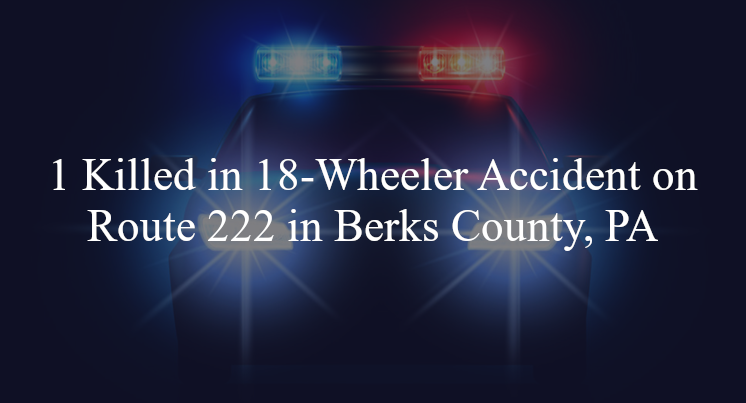1 Killed in 18-Wheeler Accident on Route 222 in Berks County, PA
Berks County, PA — June 26, 2025, One person was killed following a car accident that occurred at around 7:45 A.M. on Route 222.

According to reports, a vehicle was traveling on Route 222 near Allentown Pike when it left the road for unknown reasons and struck the trailer of a parked 18-wheeler.
When first responders arrived on the scene they found the driver fatally injured and pronounced them deceased. The identity of the driver has not been released, and the cause of the crash is under investigation.
Commentary
When a vehicle leaves the roadway and strikes the trailer of a parked 18-wheeler, people naturally ask: what caused the vehicle to veer off course—and why was the trailer positioned where it could be hit? According to reports, this crash happened along Route 222 near Allentown Pike. The driver of the vehicle was pronounced deceased at the scene, and the cause of the crash remains under investigation.
Vehicle Departure Is Only Half the Story
While it's reported that the vehicle left the roadway “for unknown reasons,” that doesn't automatically mean the driver was at fault. Medical emergencies, distraction, or mechanical failure are all possibilities that investigators will need to consider. But just as important is the location and condition of the parked 18-wheeler.
Where was the truck parked? Was it fully off the roadway? Was it legally stopped? Commercial vehicles are required to follow strict rules when stopping or parking—especially on or near travel lanes. If the trailer extended into the shoulder or lacked proper hazard markings, that could be a significant contributing factor.
Parked Trailers Still Carry Responsibility
A parked trailer may not seem like an active participant in a crash, but its presence—and how it's positioned—can create a hazard. Federal regulations require truck drivers to use reflective triangles, flashers, and proper lighting when parked near moving traffic. If those precautions weren’t taken, then the trucking company may share responsibility for the outcome.
I’ve seen cases where a truck was technically "off the road" but still left parts of the trailer jutting into the shoulder or travel lane. In low-light conditions or poor visibility, drivers approaching from behind often don’t see the hazard until it’s too late.
The Scene Demands a Close Look
Key evidence will include skid marks, impact angles, dash cam or surveillance footage, and visibility conditions at the time of the crash. Investigators should also review any data from the vehicle's onboard systems, which could show whether the driver attempted to brake or steer away. Equally important is documentation from the truck itself—driver logs, stop records, and whether required safety measures were in place while the vehicle was parked.
Key Takeaways
- A vehicle left the roadway and struck a parked 18-wheeler’s trailer, but the cause of the departure remains unknown.
- The position, visibility, and legality of the parked trailer must be thoroughly examined.
- Parked commercial vehicles are subject to strict safety rules, including proper lighting and warning devices.
- Investigators should review both the driver’s actions and the truck’s placement and compliance with safety protocols.
- A full investigation is needed to determine whether the crash was avoidable—and who may be responsible.

*We appreciate your feedback and welcome anyone to comment on our blog entries, however all visitor blog comments must be approved by the site moderator prior to showing live on the site. By submitting a blog comment you acknowledge that your post may appear live on the site for any visitors to see, pending moderator approval. The operators of this site are not responsible for the accuracy or content of the comments made by site visitors. By submitting a comment, blog post, or email to this site you acknowledge that you may receive a response with regard to your questions or concerns. If you contact Grossman Law Offices using this online form, your message will not create an attorney-client relationship and will not necessarily be treated as privileged or confidential! You should not send sensitive or confidential information via the Internet. Since the Internet is not necessarily a secure environment, it is not possible to ensure that your message sent via the Internet might be kept secure and confidential. When you fill out a contact or comment form, send us an email directly, initiate a chat session or call us, you acknowledge we may use your contact information to communicate with you in the future for marketing purposes, but such marketing will always be done in an ethical way.